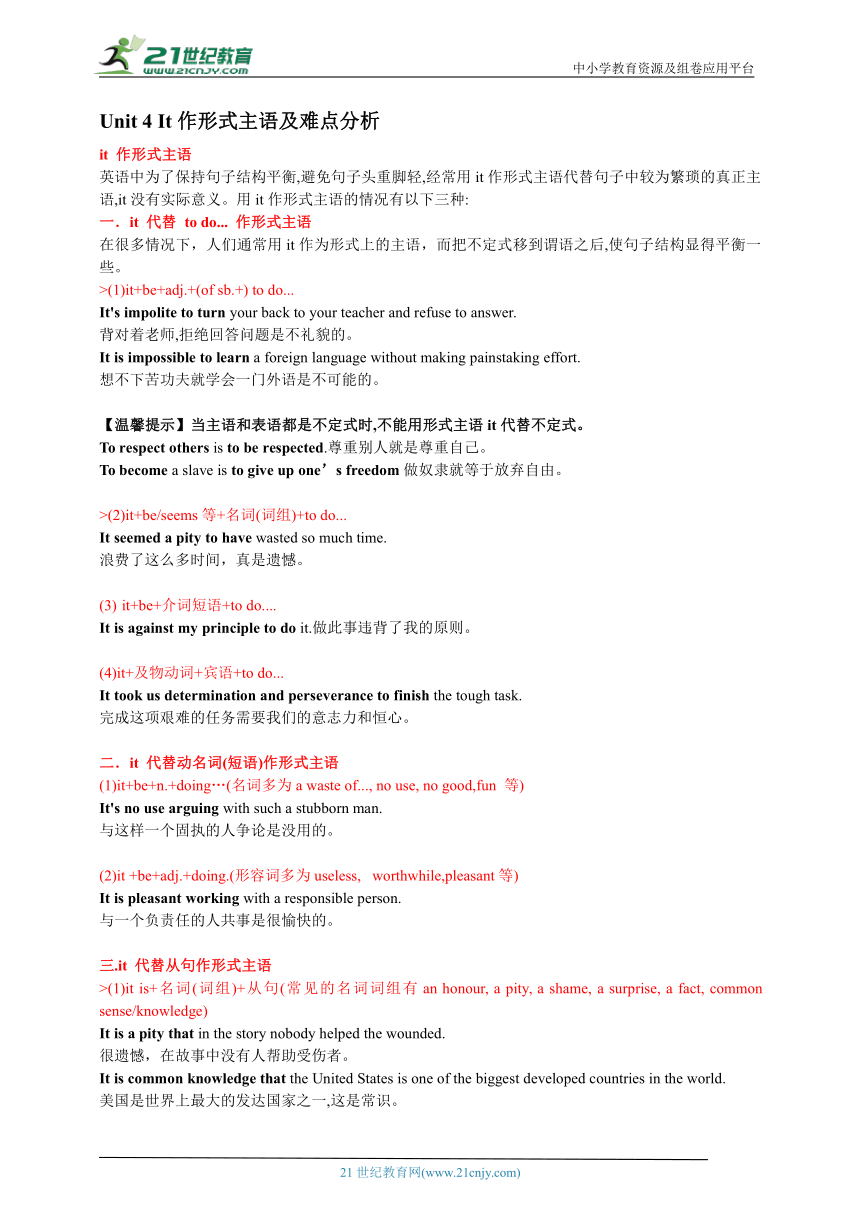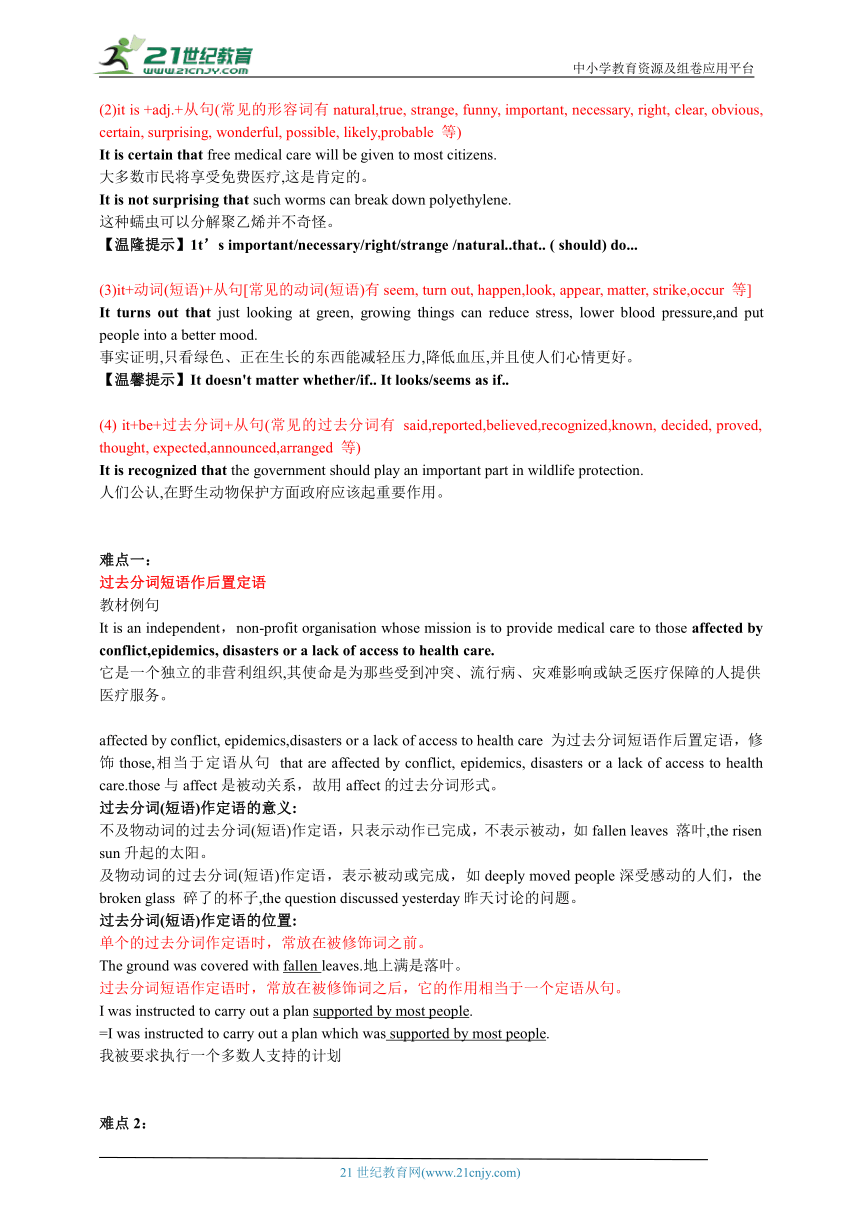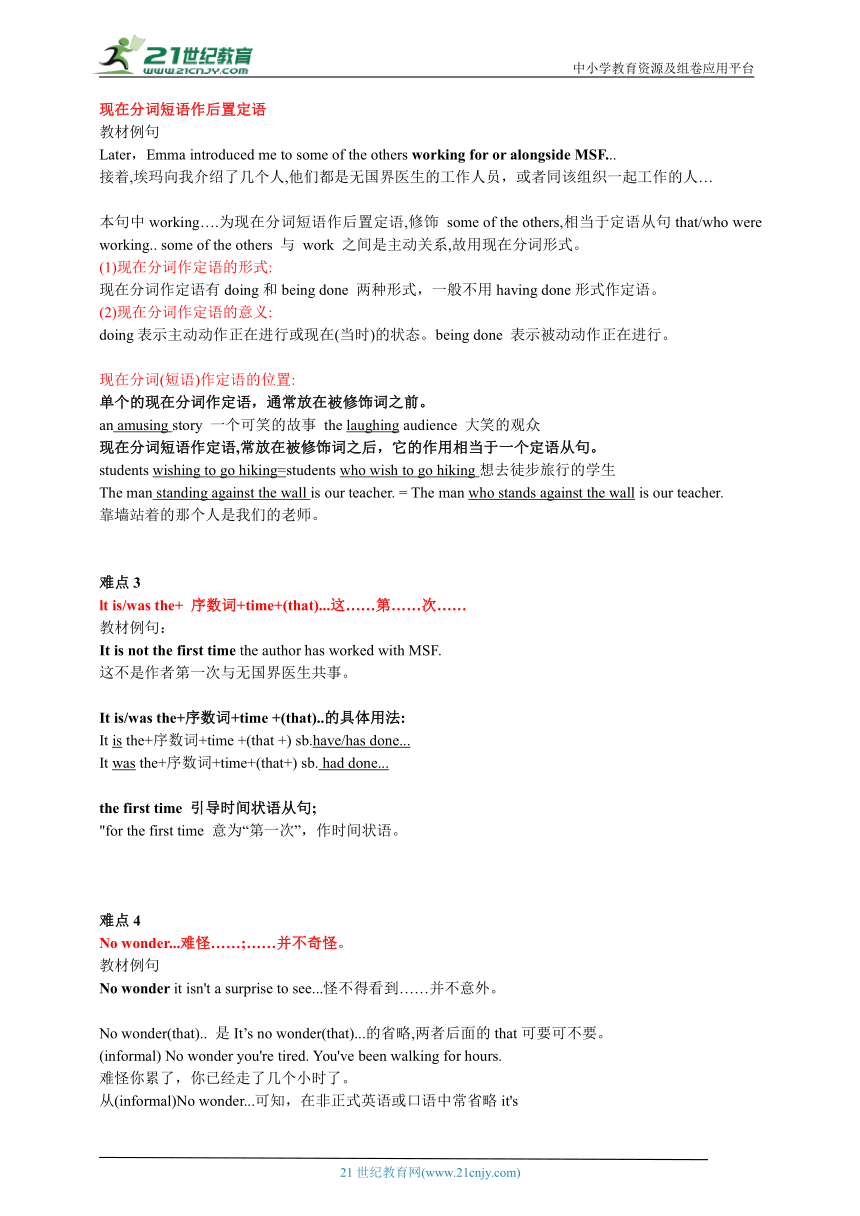(2019外研版)选修二unit 4 讲义(精讲)
文档属性
| 名称 | (2019外研版)选修二unit 4 讲义(精讲) |

|
|
| 格式 | doc | ||
| 文件大小 | 280.6KB | ||
| 资源类型 | 试卷 | ||
| 版本资源 | 外研版(2019) | ||
| 科目 | 英语 | ||
| 更新时间 | 2024-05-06 00:00:00 | ||
图片预览



文档简介
中小学教育资源及组卷应用平台
Unit 4 It作形式主语及难点分析
it 作形式主语
英语中为了保持句子结构平衡,避免句子头重脚轻,经常用it作形式主语代替句子中较为繁琐的真正主语,it没有实际意义。用it作形式主语的情况有以下三种:
一.it 代替 to do... 作形式主语
在很多情况下,人们通常用it作为形式上的主语,而把不定式移到谓语之后,使句子结构显得平衡一些。
>(1)it+be+adj.+(of sb.+) to do...
It's impolite to turn your back to your teacher and refuse to answer.
背对着老师,拒绝回答问题是不礼貌的。
It is impossible to learn a foreign language without making painstaking effort.
想不下苦功夫就学会一门外语是不可能的。
【温馨提示】当主语和表语都是不定式时,不能用形式主语it代替不定式。
To respect others is to be respected.尊重别人就是尊重自己。
To become a slave is to give up one’s freedom做奴隶就等于放弃自由。
>(2)it+be/seems等+名词(词组)+to do...
It seemed a pity to have wasted so much time.
浪费了这么多时间,真是遗憾。
it+be+介词短语+to do....
It is against my principle to do it.做此事违背了我的原则。
(4)it+及物动词+宾语+to do...
It took us determination and perseverance to finish the tough task.
完成这项艰难的任务需要我们的意志力和恒心。
二.it 代替动名词(短语)作形式主语
(1)it+be+n.+doing…(名词多为a waste of..., no use, no good,fun 等)
It's no use arguing with such a stubborn man.
与这样一个固执的人争论是没用的。
(2)it +be+adj.+doing.(形容词多为useless, worthwhile,pleasant等)
It is pleasant working with a responsible person.
与一个负责任的人共事是很愉快的。
三.it 代替从句作形式主语
>(1)it is+名词(词组)+从句(常见的名词词组有an honour, a pity, a shame, a surprise, a fact, common sense/knowledge)
It is a pity that in the story nobody helped the wounded.
很遗憾,在故事中没有人帮助受伤者。
It is common knowledge that the United States is one of the biggest developed countries in the world.
美国是世界上最大的发达国家之一,这是常识。
(2)it is +adj.+从句(常见的形容词有natural,true, strange, funny, important, necessary, right, clear, obvious, certain, surprising, wonderful, possible, likely,probable 等)
It is certain that free medical care will be given to most citizens.
大多数市民将享受免费医疗,这是肯定的。
It is not surprising that such worms can break down polyethylene.
这种蠕虫可以分解聚乙烯并不奇怪。
【温隆提示】1t’s important/necessary/right/strange /natural..that.. ( should) do...
(3)it+动词(短语)+从句[常见的动词(短语)有seem, turn out, happen,look, appear, matter, strike,occur 等]
It turns out that just looking at green, growing things can reduce stress, lower blood pressure,and put people into a better mood.
事实证明,只看绿色、正在生长的东西能减轻压力,降低血压,并且使人们心情更好。
【温馨提示】It doesn't matter whether/if.. It looks/seems as if..
it+be+过去分词+从句(常见的过去分词有 said,reported,believed,recognized,known, decided, proved, thought, expected,announced,arranged 等)
It is recognized that the government should play an important part in wildlife protection.
人们公认,在野生动物保护方面政府应该起重要作用。
难点一:
过去分词短语作后置定语
教材例句
It is an independent,non-profit organisation whose mission is to provide medical care to those affected by conflict,epidemics, disasters or a lack of access to health care.
它是一个独立的非营利组织,其使命是为那些受到冲突、流行病、灾难影响或缺乏医疗保障的人提供医疗服务。
affected by conflict, epidemics,disasters or a lack of access to health care 为过去分词短语作后置定语,修饰those,相当于定语从句 that are affected by conflict, epidemics, disasters or a lack of access to health care.those与affect是被动关系,故用affect的过去分词形式。
过去分词(短语)作定语的意义:
不及物动词的过去分词(短语)作定语,只表示动作已完成,不表示被动,如fallen leaves 落叶,the risen sun升起的太阳。
及物动词的过去分词(短语)作定语,表示被动或完成,如deeply moved people深受感动的人们,the broken glass 碎了的杯子,the question discussed yesterday昨天讨论的问题。
过去分词(短语)作定语的位置:
单个的过去分词作定语时,常放在被修饰词之前。
The ground was covered with fallen leaves.地上满是落叶。
过去分词短语作定语时,常放在被修饰词之后,它的作用相当于一个定语从句。
I was instructed to carry out a plan supported by most people.
=I was instructed to carry out a plan which was supported by most people.
我被要求执行一个多数人支持的计划
难点2:
现在分词短语作后置定语
教材例句
Later,Emma introduced me to some of the others working for or alongside MSF...
接着,埃玛向我介绍了几个人,他们都是无国界医生的工作人员,或者同该组织一起工作的人…
本句中working….为现在分词短语作后置定语,修饰 some of the others,相当于定语从句that/who were working.. some of the others 与 work 之间是主动关系,故用现在分词形式。
(1)现在分词作定语的形式:
现在分词作定语有doing和being done 两种形式,一般不用having done形式作定语。
(2)现在分词作定语的意义:
doing表示主动动作正在进行或现在(当时)的状态。being done 表示被动动作正在进行。
现在分词(短语)作定语的位置:
单个的现在分词作定语,通常放在被修饰词之前。
an amusing story 一个可笑的故事 the laughing audience 大笑的观众
现在分词短语作定语,常放在被修饰词之后,它的作用相当于一个定语从句。
students wishing to go hiking=students who wish to go hiking想去徒步旅行的学生
The man standing against the wall is our teacher. = The man who stands against the wall is our teacher.
靠墙站着的那个人是我们的老师。
难点3
lt is/was the+ 序数词+time+(that)...这……第……次……
教材例句:
It is not the first time the author has worked with MSF.
这不是作者第一次与无国界医生共事。
It is/was the+序数词+time +(that)..的具体用法:
It is the+序数词+time +(that +) sb.have/has done...
It was the+序数词+time+(that+) sb. had done...
the first time 引导时间状语从句;
"for the first time 意为“第一次”,作时间状语。
难点4
No wonder...难怪……;……并不奇怪。
教材例句
No wonder it isn't a surprise to see...怪不得看到……并不意外。
No wonder(that).. 是It’s no wonder(that)...的省略,两者后面的that可要可不要。
(informal) No wonder you're tired. You've been walking for hours.
难怪你累了,你已经走了几个小时了。
从(informal)No wonder...可知,在非正式英语或口语中常省略it's
wonder的其他用法:
It's a wonder that... 令人惊奇的是…… it作形式主语,真正的主语是that从句。
What a wonder!多么令人惊异!/真想不到!
in wonder 惊讶地
wonder at/about对……感到疑惑/奇怪
wonder+wh-从句
wonder+wh-词+to do对……感到奇怪;想知道……
·I wonder if/whether...表示“我不知道是否……”,
此句型中if或whether引导宾语从句。该句型多用于口语中,表示有礼貌地询问某事或请求帮助。
难点5
whether引导的宾语从句
教材例句
Now we are engaged in a great civil war,testing whether that nation,or any nation, so conceived,and so dedicated,can long endure。
当下我们正深陷于一场大规模的内战之中,它考验着这个国家,或者任何一个生于自由、对上述理想深信不疑的国家,能否长久生存下去。
whether 意为“是否”,在本句中引导宾语从句,且在宾语从句中不作成分,只起连接作用,可用if替换。
whether或if引导宾语从句,作“是否”讲时常放在动词ask,see,say,know和 find out等后面。一般情况下,两者可互换,在口语中多用if。
Nobody knows whether/if it will rain tomorrow. 没有人知道明天是否会下雨。
whether或if引导宾语从句时,要注意三个方面,即连词、语序和时态。
whether 或if不能和that 或其他连词、副词同时使用,也不能省去。
(x)I don't know that whether/if he will come here today.
(√)I don't know whether/if he will come here today.
我不知道他今天是否会来。
(2)whether或if引导宾语从句时,虽具有疑问意义,但从句语序应用陈述语序。
The old woman asked me whether/if I knew the way to the hospital.
老妇人问我是否知道去医院的路。
(3)whether或f引导的宾语从句应和主句的时态保持一致。即主句为一般现在时,从句应用现在时中的任一种时态;主句为一般过去时,从句则用过去的相应时态。
I don't know whether/if he has come here.我不知道他是否来了这儿。
Tom asked whether/if I had read the book.汤姆问我是否看过这本书。
只用whether不用if的几种情况:
(1)引导介词宾语从句时,通常用whether。
(2)引导置于句首的主语从句、引导表语从句或同位语从句时,用 whether。
Whether he will come is not known.他是否来还不知道。
The question is whether we should go on with the work. 问题是我们是否应该继续这项工作。
It's not a question whether he is rude.这不是他是否粗鲁的问题。
(3)其后与to do 连用时,用whether。
He wondered whether to wait for them or (to) leave immediately.
他不知道是等他们还是马上离开。
(4)其后直接与or not连用时,用whether
I'll write to you whether or not I can come. 不管能不能来,我都将给你写信。
本单元词组:
take any chances 冒险
against all odds 尽管困难重重
At a great cost 以极大的代价
Die for 为...而献身;急需...
Bring forth 使产生;使出现
Comrade in arms 共患难的同志;战友
Step into one’s shoes 接替某人
Suffer for 为...而受苦
Dedicate to 致力于
In a larger sense 从更大意义上说
Put...at risk 把...置于危险境地
In memory of 为了纪念
Look to 指望;依靠;留心
Engage in 参加
In vain 白白地;徒劳的
A lack of 缺乏
Regardless of 不管;不顾
The top priority 当务之急;重中之重
Be involved in 参加;参与;专心于
Work on 致力于;从事;努力提高;努力说服
Be amazed to do 对做...感到惊讶
Make up one’s mind 下定决心
Call on/upon 请求;要求;需求;号召;拜访
Be likely to do sth.可能做某事
In particular 尤其;特别
Settle down 定居;平静下来
Bring..together 使...结合/连接;使...会面
Merge into 使汇合;使并入
Have an effect on =affect =have an influence on 对...有影响
Have a good understanding of 很好地理解;充分了解
Set food in 步入;涉足
Take place 发生
At a great cost 代价惨重;付出巨大代价
Step by step 逐步地;一步一步地
Carry out 执行;实行;进行;贯彻
Capture the spirit of 领会...的精神
21世纪教育网 www.21cnjy.com 精品试卷·第 2 页 (共 2 页)
21世纪教育网(www.21cnjy.com)
Unit 4 It作形式主语及难点分析
it 作形式主语
英语中为了保持句子结构平衡,避免句子头重脚轻,经常用it作形式主语代替句子中较为繁琐的真正主语,it没有实际意义。用it作形式主语的情况有以下三种:
一.it 代替 to do... 作形式主语
在很多情况下,人们通常用it作为形式上的主语,而把不定式移到谓语之后,使句子结构显得平衡一些。
>(1)it+be+adj.+(of sb.+) to do...
It's impolite to turn your back to your teacher and refuse to answer.
背对着老师,拒绝回答问题是不礼貌的。
It is impossible to learn a foreign language without making painstaking effort.
想不下苦功夫就学会一门外语是不可能的。
【温馨提示】当主语和表语都是不定式时,不能用形式主语it代替不定式。
To respect others is to be respected.尊重别人就是尊重自己。
To become a slave is to give up one’s freedom做奴隶就等于放弃自由。
>(2)it+be/seems等+名词(词组)+to do...
It seemed a pity to have wasted so much time.
浪费了这么多时间,真是遗憾。
it+be+介词短语+to do....
It is against my principle to do it.做此事违背了我的原则。
(4)it+及物动词+宾语+to do...
It took us determination and perseverance to finish the tough task.
完成这项艰难的任务需要我们的意志力和恒心。
二.it 代替动名词(短语)作形式主语
(1)it+be+n.+doing…(名词多为a waste of..., no use, no good,fun 等)
It's no use arguing with such a stubborn man.
与这样一个固执的人争论是没用的。
(2)it +be+adj.+doing.(形容词多为useless, worthwhile,pleasant等)
It is pleasant working with a responsible person.
与一个负责任的人共事是很愉快的。
三.it 代替从句作形式主语
>(1)it is+名词(词组)+从句(常见的名词词组有an honour, a pity, a shame, a surprise, a fact, common sense/knowledge)
It is a pity that in the story nobody helped the wounded.
很遗憾,在故事中没有人帮助受伤者。
It is common knowledge that the United States is one of the biggest developed countries in the world.
美国是世界上最大的发达国家之一,这是常识。
(2)it is +adj.+从句(常见的形容词有natural,true, strange, funny, important, necessary, right, clear, obvious, certain, surprising, wonderful, possible, likely,probable 等)
It is certain that free medical care will be given to most citizens.
大多数市民将享受免费医疗,这是肯定的。
It is not surprising that such worms can break down polyethylene.
这种蠕虫可以分解聚乙烯并不奇怪。
【温隆提示】1t’s important/necessary/right/strange /natural..that.. ( should) do...
(3)it+动词(短语)+从句[常见的动词(短语)有seem, turn out, happen,look, appear, matter, strike,occur 等]
It turns out that just looking at green, growing things can reduce stress, lower blood pressure,and put people into a better mood.
事实证明,只看绿色、正在生长的东西能减轻压力,降低血压,并且使人们心情更好。
【温馨提示】It doesn't matter whether/if.. It looks/seems as if..
it+be+过去分词+从句(常见的过去分词有 said,reported,believed,recognized,known, decided, proved, thought, expected,announced,arranged 等)
It is recognized that the government should play an important part in wildlife protection.
人们公认,在野生动物保护方面政府应该起重要作用。
难点一:
过去分词短语作后置定语
教材例句
It is an independent,non-profit organisation whose mission is to provide medical care to those affected by conflict,epidemics, disasters or a lack of access to health care.
它是一个独立的非营利组织,其使命是为那些受到冲突、流行病、灾难影响或缺乏医疗保障的人提供医疗服务。
affected by conflict, epidemics,disasters or a lack of access to health care 为过去分词短语作后置定语,修饰those,相当于定语从句 that are affected by conflict, epidemics, disasters or a lack of access to health care.those与affect是被动关系,故用affect的过去分词形式。
过去分词(短语)作定语的意义:
不及物动词的过去分词(短语)作定语,只表示动作已完成,不表示被动,如fallen leaves 落叶,the risen sun升起的太阳。
及物动词的过去分词(短语)作定语,表示被动或完成,如deeply moved people深受感动的人们,the broken glass 碎了的杯子,the question discussed yesterday昨天讨论的问题。
过去分词(短语)作定语的位置:
单个的过去分词作定语时,常放在被修饰词之前。
The ground was covered with fallen leaves.地上满是落叶。
过去分词短语作定语时,常放在被修饰词之后,它的作用相当于一个定语从句。
I was instructed to carry out a plan supported by most people.
=I was instructed to carry out a plan which was supported by most people.
我被要求执行一个多数人支持的计划
难点2:
现在分词短语作后置定语
教材例句
Later,Emma introduced me to some of the others working for or alongside MSF...
接着,埃玛向我介绍了几个人,他们都是无国界医生的工作人员,或者同该组织一起工作的人…
本句中working….为现在分词短语作后置定语,修饰 some of the others,相当于定语从句that/who were working.. some of the others 与 work 之间是主动关系,故用现在分词形式。
(1)现在分词作定语的形式:
现在分词作定语有doing和being done 两种形式,一般不用having done形式作定语。
(2)现在分词作定语的意义:
doing表示主动动作正在进行或现在(当时)的状态。being done 表示被动动作正在进行。
现在分词(短语)作定语的位置:
单个的现在分词作定语,通常放在被修饰词之前。
an amusing story 一个可笑的故事 the laughing audience 大笑的观众
现在分词短语作定语,常放在被修饰词之后,它的作用相当于一个定语从句。
students wishing to go hiking=students who wish to go hiking想去徒步旅行的学生
The man standing against the wall is our teacher. = The man who stands against the wall is our teacher.
靠墙站着的那个人是我们的老师。
难点3
lt is/was the+ 序数词+time+(that)...这……第……次……
教材例句:
It is not the first time the author has worked with MSF.
这不是作者第一次与无国界医生共事。
It is/was the+序数词+time +(that)..的具体用法:
It is the+序数词+time +(that +) sb.have/has done...
It was the+序数词+time+(that+) sb. had done...
the first time 引导时间状语从句;
"for the first time 意为“第一次”,作时间状语。
难点4
No wonder...难怪……;……并不奇怪。
教材例句
No wonder it isn't a surprise to see...怪不得看到……并不意外。
No wonder(that).. 是It’s no wonder(that)...的省略,两者后面的that可要可不要。
(informal) No wonder you're tired. You've been walking for hours.
难怪你累了,你已经走了几个小时了。
从(informal)No wonder...可知,在非正式英语或口语中常省略it's
wonder的其他用法:
It's a wonder that... 令人惊奇的是…… it作形式主语,真正的主语是that从句。
What a wonder!多么令人惊异!/真想不到!
in wonder 惊讶地
wonder at/about对……感到疑惑/奇怪
wonder+wh-从句
wonder+wh-词+to do对……感到奇怪;想知道……
·I wonder if/whether...表示“我不知道是否……”,
此句型中if或whether引导宾语从句。该句型多用于口语中,表示有礼貌地询问某事或请求帮助。
难点5
whether引导的宾语从句
教材例句
Now we are engaged in a great civil war,testing whether that nation,or any nation, so conceived,and so dedicated,can long endure。
当下我们正深陷于一场大规模的内战之中,它考验着这个国家,或者任何一个生于自由、对上述理想深信不疑的国家,能否长久生存下去。
whether 意为“是否”,在本句中引导宾语从句,且在宾语从句中不作成分,只起连接作用,可用if替换。
whether或if引导宾语从句,作“是否”讲时常放在动词ask,see,say,know和 find out等后面。一般情况下,两者可互换,在口语中多用if。
Nobody knows whether/if it will rain tomorrow. 没有人知道明天是否会下雨。
whether或if引导宾语从句时,要注意三个方面,即连词、语序和时态。
whether 或if不能和that 或其他连词、副词同时使用,也不能省去。
(x)I don't know that whether/if he will come here today.
(√)I don't know whether/if he will come here today.
我不知道他今天是否会来。
(2)whether或if引导宾语从句时,虽具有疑问意义,但从句语序应用陈述语序。
The old woman asked me whether/if I knew the way to the hospital.
老妇人问我是否知道去医院的路。
(3)whether或f引导的宾语从句应和主句的时态保持一致。即主句为一般现在时,从句应用现在时中的任一种时态;主句为一般过去时,从句则用过去的相应时态。
I don't know whether/if he has come here.我不知道他是否来了这儿。
Tom asked whether/if I had read the book.汤姆问我是否看过这本书。
只用whether不用if的几种情况:
(1)引导介词宾语从句时,通常用whether。
(2)引导置于句首的主语从句、引导表语从句或同位语从句时,用 whether。
Whether he will come is not known.他是否来还不知道。
The question is whether we should go on with the work. 问题是我们是否应该继续这项工作。
It's not a question whether he is rude.这不是他是否粗鲁的问题。
(3)其后与to do 连用时,用whether。
He wondered whether to wait for them or (to) leave immediately.
他不知道是等他们还是马上离开。
(4)其后直接与or not连用时,用whether
I'll write to you whether or not I can come. 不管能不能来,我都将给你写信。
本单元词组:
take any chances 冒险
against all odds 尽管困难重重
At a great cost 以极大的代价
Die for 为...而献身;急需...
Bring forth 使产生;使出现
Comrade in arms 共患难的同志;战友
Step into one’s shoes 接替某人
Suffer for 为...而受苦
Dedicate to 致力于
In a larger sense 从更大意义上说
Put...at risk 把...置于危险境地
In memory of 为了纪念
Look to 指望;依靠;留心
Engage in 参加
In vain 白白地;徒劳的
A lack of 缺乏
Regardless of 不管;不顾
The top priority 当务之急;重中之重
Be involved in 参加;参与;专心于
Work on 致力于;从事;努力提高;努力说服
Be amazed to do 对做...感到惊讶
Make up one’s mind 下定决心
Call on/upon 请求;要求;需求;号召;拜访
Be likely to do sth.可能做某事
In particular 尤其;特别
Settle down 定居;平静下来
Bring..together 使...结合/连接;使...会面
Merge into 使汇合;使并入
Have an effect on =affect =have an influence on 对...有影响
Have a good understanding of 很好地理解;充分了解
Set food in 步入;涉足
Take place 发生
At a great cost 代价惨重;付出巨大代价
Step by step 逐步地;一步一步地
Carry out 执行;实行;进行;贯彻
Capture the spirit of 领会...的精神
21世纪教育网 www.21cnjy.com 精品试卷·第 2 页 (共 2 页)
21世纪教育网(www.21cnjy.com)
